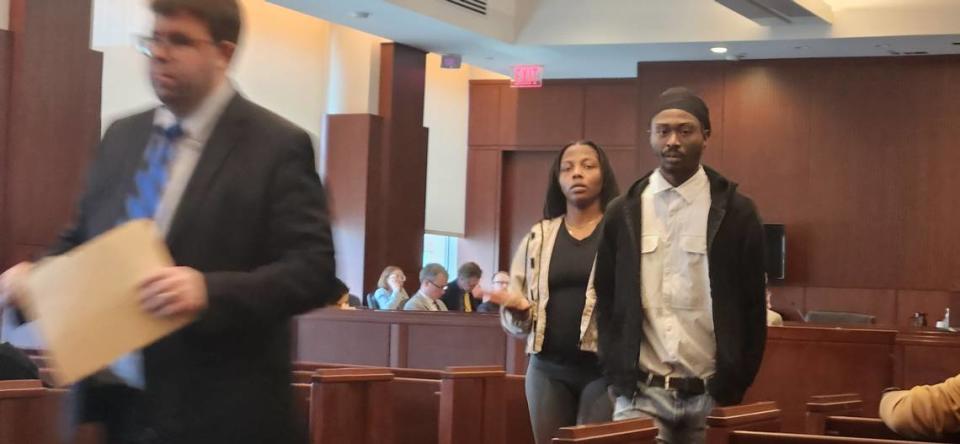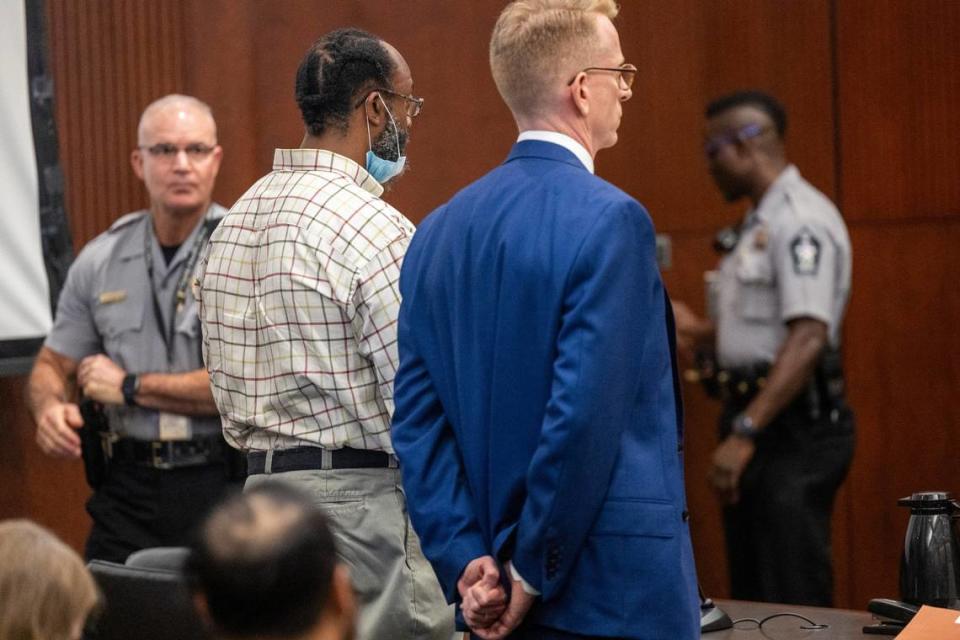Raleigh police informant sentenced after lying about heroin sales to make more cash
As a former Raleigh police informant, Dennis Leon Williams Jr.’s false accusations led to faulty arrests and wrongful raids on family homes.
Now Williams is heading to prison for up to 3.75 years, after pleading guilty to five felony counts of obstructing justice Wednesday.
His sentence is based on the total amount of time that people wrongfully charged with drug crimes spent in jail, said Wake County Assistant District Attorney David Saacks.
“It is a very symbolic sentence,” Saacks said in the courtroom before the sentencing.
Wake County Superior Court Judge Rebecca Holt sentenced Dennis Leon Williams Jr. from 2.5 years to 3.75 years in prison. Williams, who pleaded guilty as part of an agreement with prosecutors, said little during the hearing.
Part of the agreement allowed Williams to walk out of the courtroom and not start his sentence until June 3. In addition, prosecutors dropped several other charges against him, including common law robbery, breaking and entering and possession of a stolen motor vehicle.
Williams and his attorney Michael McFarland declined to comment after the hearing.

‘The offense was infamous’
The criminal case against Williams stemmed from him lying to police while a paid confidential informant for the Raleigh Police Department’s drug and vice unit. Williams was charged with five obstruction of justice charges for falsely claiming individuals sold him heroin on five dates from March 12, 2020 to May 15, 2020.
“The offense was infamous, was committed with secrecy and malice, and was done with deceit and intent to defraud,” Williams’ indictment said.
There were a total of about 15 incidents related to the charges, but only five individuals implicated in drug purchases indicated they would cooperate with police in Williams’ prosecution, Saacks said.
Williams isn’t the only one paying a cost for the trickery. In October, Omar Abdullah, a fired detective who recruited and managed Williams, pleaded guilty to one count of obstruction of justice and was sentenced to 38 days in jail and 24 months of supervised probation.
Abdullah’s supervisor Sgt. William Rolfe was demoted to police detective and left the agency in February 2023, according to a civil court deposition and Raleigh police records.
In court last fall, Abdullah denied participating in any scheme but contended Williams took advantage of Abdullah’s hard charging nature and push to excel as a detective on the drugs and vice squad.
Williams was recruited by police after he was arrested in Raleigh for possessing what they thought was cocaine, but later was found to be fake cocaine. Police gave him the nickname Aspirin, according to related civil lawsuits filed against the city of Raleigh.
Williams, who had a lot of contacts with people who sold marijuana, worked for the police for about a year without any issues, Saacks said during his sentencing hearing. After serving a short sentence for a probation issue, Williams returned to working for police and learned the department would pay him more working on cases that involved heroin.
“This became more of a money making thing, more than anything,” Saacks said.

Defense attorney raised concerns
Concerns about Abdullah and Williams’ work surfaced in early 2020. A defense attorney representing men arrested by the detective brought questions about the drug evidence gathered by Abdullah and Williams to District Attorney Lorrin Freeman, according to interviews.
Williams claimed he was buying trafficking levels of heroin from Raleigh men, but the substances turned out to be counterfeit when they were tested.
By September 2020, Raleigh police and Freeman were investigating false evidence in more than a dozen drug cases. Abdullah was placed on administrative leave during the investigation and was fired about a year later.
About a dozen men spent a collective two-and-a-half years behind bars before their charges were dismissed, states an April 2021 federal lawsuit filed by some of those men and their families. The men lost jobs and missed cancer treatments and time with their children.
More details of the case came to light in April 2021 after individuals filed the first of three federal lawsuits related to Abdullah’s and Williams’ drug arrests. The lawsuit accused Abdullah of conspiring with Williams to send more than a dozen Black men to jail and prison in a fake heroin scheme. Within five months, the city settled the claim for $2 million without admitting any fault.
The lawsuit included individuals who faced heroin charges, and in one case a marijuana charge, for substances provided by Williams that turned out to be fake.
A second federal lawsuit was filed in February 2022. That lawsuit contends Abdullah and others conspired to fabricate heroin trafficking offenses that led to an illegal raid, excessive force and the false imprisonment of 10 Black women and children. City officials settled that lawsuit in June, agreeing to pay three families a total of $350,000.
A third lawsuit filed in June 2022 was dismissed in May 2023.
Virginia Bridges covers criminal justice in the Triangle and across North Carolina for The News & Observer. Her work is produced with financial support from the nonprofit The Just Trust. The N&O maintains full editorial control of its journalism.

